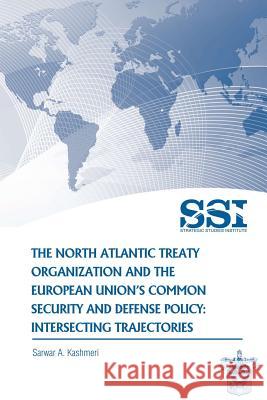The North Atlantic Treaty Organization and the European Union's Common Security and Defense Policy: Intersecting Trajectories » książka
The North Atlantic Treaty Organization and the European Union's Common Security and Defense Policy: Intersecting Trajectories
ISBN-13: 9781478120520 / Angielski / Miękka / 2012 / 58 str.
The North Atlantic Treaty Organization and the European Union's Common Security and Defense Policy: Intersecting Trajectories
ISBN-13: 9781478120520 / Angielski / Miękka / 2012 / 58 str.
(netto: 69,32 VAT: 5%)
Najniższa cena z 30 dni: 71,80
ok. 16-18 dni roboczych.
Darmowa dostawa!
In this study, Mr. Kashmeri argues his thesis that the North Atlantic Treaty Organization (NATO) has evolved from a confident, mission driven Alliance with a clear objective, to an organization that appears to be in disar ray, still looking for a unifying mission 20 years after its reason for creation-the Soviet Union- ceased to exist. Mr. Kashmeri maintains that the action to enforce United Nations Security Council Resolution (UNSCR) 1073 against Libya is the latest in a series of demonstrations that highlight the disarray of the Alliance. He states that after weeks of preparation and increasingly optimistic statements about its readiness to enforce the UNSCR, Britain, France, and the United States chose to intervene in Libya alone. Mr. Kashmeri believes that NATO was once again sidelined as it had been after September 11, 2001 (9/11), when the United States unilaterally decided to go to war in Afghanistan. He argues that Afghanistan continues to demonstrate that, even in a deployment, NATO is far from a monolithic, efficient fighting force, since many of the allies have refused to participate in that war and, even before the end of the campaign, some are going home. The primary question that Mr. Kashmeri attempts to answer is: So, what next for the once fabled alliance? In doing so, Mr. Kashmeri points out that during NATO's deterioration the European Union's (EU) Common Security and Defense Policy (CSDP) has deployed 27 successful military/civil missions from Africa to Asia. These include the EU Naval force off Somalia-that is twice the size of NATO's-and the EU mission to Chad that successfully deployed and sus tained a mobile fighting force of 3,800 troops thousands of kilometers from Brussels, Belgium. Mr. Kashmeri contends that through CSDP, Europeans are increasingly taking charge of manag ing their own foreign and security policy. NATO is no longer the sole and preeminent Euro-Atlantic security actor. Mr. Kashmeri asserts that NATO's survival depends on its willingness to accept its reduced role and let the EU handle the day-to-day security needs of Europe and its periphery. NATO's continued existence, Kashmeri maintains, is in a supporting capacity to CSDP and in its ability to craft a relationship with CSDP that will allow North America and Europe to act militarily together, should that ever become necessary. Mr. Kashmeri believes that watching NATO fade into irrelevance would be a mistake, since it is a tried and true platform to harness the resources of North America and Europe. In conclusion, Mr. Kashmeri suggests that it is time for NATO 2.0, a new version of NATO that fits the realities of an ever more integrated Europe in the 21st century.
Zawartość książki może nie spełniać oczekiwań – reklamacje nie obejmują treści, która mogła nie być redakcyjnie ani merytorycznie opracowana.











